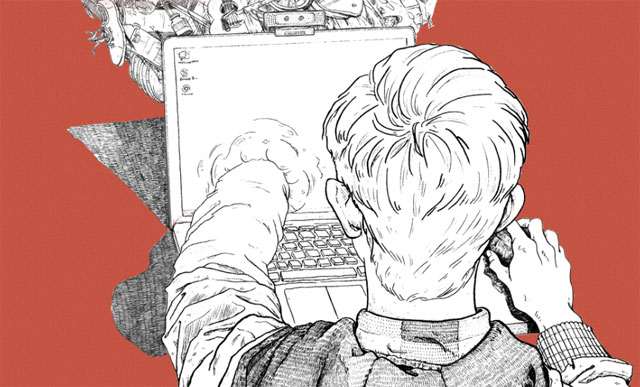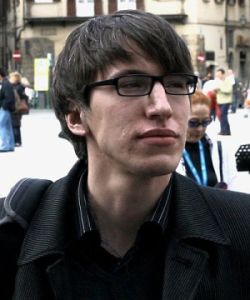Intel Perceptual Computing Challenge Contest. Motivational post

In February, we announced the start of the first stage of the contest for applications based on the Intel Perceptual SDK with a prize fund of $ 1,000,000 (one million dollars). This stage has already ended, moreover, a new one has begun, in which, as promised, the amount of cash prizes has been significantly increased. We have already written about the rules of the second round on Habré, we want to remind about it again and invite everyone to participate in it. Under the cut - a lot of videos with applications, the winners of the first round, a lot of round sums, which will receive the winners of the second, the answers to questions, as well as exclusive - an interview with the winner of the contest from Russia.
Winners of the first stage
According to the results of the first round, the jury determined the winners: 3 people received the main prize, 16 people - the first and 25 - the second. Here they are, our "gold medalists":Matthew Pilz (Matthew Pilz), USA, with the Magic Doodle Pad app for drawing with gestures;
Lin Yunfan (Lin Yunfan), China, with JOY application - audio visual synthesizer with “manual” control;
')
Matthew Hoban (Matthew Hoban), UK, with the Mystic Blocks app, a toy in which objects rotate with gestures.
Among the laureates of the competition, most of all are developers from India and the USA, but the guys from Russia also did not let us down - on our account there are 2 second prizes and 6 third prizes ! Here is a list of them - people should know their heroes!
- Evgeny Lagutkin - Perceptual Helper
- Jacob Samygin - Mercury
- Alexey Kuz'michev - Escape
- Pavel Gavrilov - Remote External Application Control and Virtual Showcase
- Alexander Maynik - FLI
- Nikolay Sushenkov - Perceptual Table Tennis
- Rinat Garipov - Intel Perceptual Presentation
- Yury Klyuch - Gesture Games
A complete list of winners and their demo can be found on a special site .
Interview with the winner
 We asked a few questions to Evgeny Lagutkin, who won the second Intel Perceptual Computing Challenge.
We asked a few questions to Evgeny Lagutkin, who won the second Intel Perceptual Computing Challenge.Eugene, how did you find out about the competition and how did you decide to participate in it?
I learned about the competition at work from my “colleague” Maxim (we are both from the IT field, but he, unlike me, is directly involved in development and programming). Honestly, at first I didn’t even have thought about participating in such a large-scale competition, and even with such a prize fund. But Max convinced me to try my hand (it is a pity that he himself could not, because he simply did not find the time). As a result, the desire to do something interesting and get for it, albeit a very elusive, but possible "bonus" won.
How did you get the idea to create such an application?
There were several ideas, but in the end I took the one that had, in my opinion, greater versatility and the most possible practical application. "Perceptual Helper" is a program that allows you to connect the real actions of the user (in the concept of movement only, and ideally everything that allows you to recognize PercSDK) and actions in the operating system.
How was the competition? How do you evaluate the organizational and technical components of the competition? What do you especially like and what not?
I have no experience of participation in such contests, so I liked almost everything :). I was pleasantly surprised by the speed of the camera delivery - 7 days from America to Russia “to the door”. The only thing that may have caused some difficulties is the dampness of the documentation in the early version of the SDK and the lack of guides for languages other than C ++ and frameworks.
What are your ideas for the future of your application? Are you going to do something in the same way?
I plan to develop and finish my demo application to a fully functional state, and have already submitted an application with a vision of the future of my idea for the second round of the competition. So far, the main goal is to get to the final (nothing motivates as much as the result :)).
What is your farewell to new contestants who are going to make their first steps? What could you advise them?
In my opinion, in the modern world, where most of the interesting, it would seem, has already been invented and invented, the main thing is the idea. So get you more fresh and original ideas. I advise you not to doubt your abilities and do what you like.
Conditions of the second stage
Now once again very briefly about the conditions of the second stage. The competition is divided into 3 phases. The first phase is the presentation of the idea. During it, participants register, provide information about themselves and present the concept of their application and its creation. Of all the applications, the jury selects no more than 750 of the most interesting ones, their compilers go to the final round. Finalists are given a special camera for temporary use; this ends the second phase and the third begins - the actual process of creating the application.Here is a sign showing the dates for all phases of the competition.
| Phase | Start | Completion |
|---|---|---|
| Filing an application | the 6th of May | June 17 |
| Definition of finalists, camera provision | June 18 | June 25 |
| Providing information about the application | June 26 | July 17th |
| Preliminary version of the application | June 26 | August 6 |
| The final version of the application | June 26 | August 13 |
Before starting work, participants provide the organizers with comprehensive information about their future application: how the user will interact with it, what Perceptual SDK components to use in it, and so on. Already at this stage you have the opportunity to receive a prize (10 prizes of $ 1000 each). The same awards are played out at the stage of providing a preliminary demo. Well, the prizes for the final demo, of course, are much larger. The main prize (the only one) is $ 100,000, plus additional assistance in the further development and promotion of the application for $ 50,000. Four first prizes of $ 75,000 plus an additional $ 12,500 for development. And finally, twelve second prizes of $ 10,000 and twenty-third of $ 5000 .
Those who, at the sight of this sequence of zeros, have played out their imagination and had an overwhelming desire to create an outstanding application on the Perceptual SDK, it is necessary to study the official document describing the conditions of the competition. All the necessary information is on the contest website .
But that is not all! As already mentioned, according to the rules of the contest, only 750 participants will be sent to the list of finalists on the basis of the tender proposals for the development of Creative * Interactive Gesture Camera. However, if you doubt the feasibility of your idea, or simply want to get a foothold for generating ideas, then we can help you. In the Moscow office of Intel, there are 10 cameras Creative * Interactive Gesture, which can be transferred for temporary use to anyone . Interested? Then please leave your application in any form in the comments to this post, and we will contact you .
Also in the comments, you can leave any of your questions related to the Intel Perceptual Computing Challenge. Intel specialists will answer them.
Well, we expect the end of the second stage of the competition to announce its winners. Who knows, maybe it will be someone from the habrazhiteli we motivated?
Source: https://habr.com/ru/post/180401/
All Articles